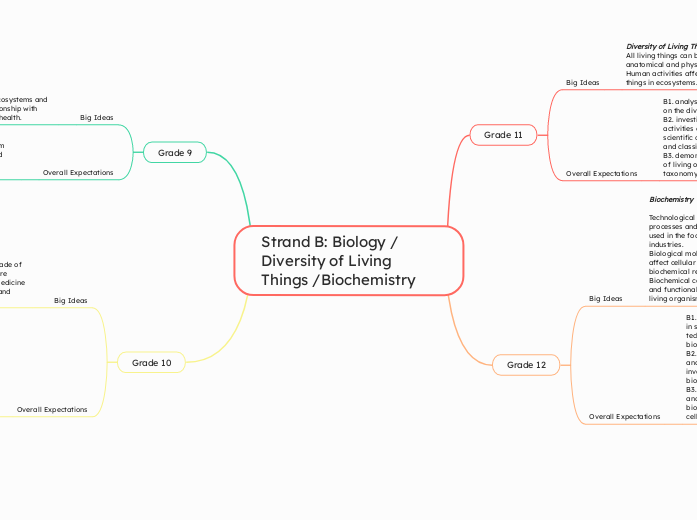Strand B: Biology / Diversity of Living Things /Biochemistry
Grade 11
Big Ideas
Diversity of Living Things
All living things can be classified according to their anatomical and physiological characteristics.
Human activities affect the diversity of living things in ecosystems.
Overall Expectations
B1. analyse the effects of various human activities on the diversity of living things;
B2. investigate, through laboratory and/or field activities or through simulations, the principles of
scientific classification, using appropriate sampling and classification techniques;
B3. demonstrate an understanding of the diversity of living organisms in terms of the principles of
taxonomy and phylogeny.
Grade 12
Big Ideas
Biochemistry
Technological applications that affect biological processes and cellular functions are
used in the food, pharmaceutical, and medical industries.
Biological molecules and their chemical properties affect cellular processes and
biochemical reactions.
Biochemical compounds play important structural and functional roles in cells of all
living organisms
Overall Expectations
B1. analyse technological applications of enzymes in some industrial processes, and evaluate
technological advances in the field of cellular biology;
B2. investigate the chemical structures, functions, and chemical properties of biological molecules
involved in some common cellular processes and biochemical reactions;
B3. demonstrate an understanding of the structures and functions of biological molecules, and the
biochemical reactions required to maintain normal cellular function
Grade 9
Big Ideas
Students learn about sustainable ecosystems and sustainability. Specifically, its relationship with biodiversity, air, water quality and health.
Overall Expectations
B1. Relating Science to Our Changing World
assess impacts of climate change on ecosystem sustainability and on various communities, and describe
ways to mitigate these impacts
Grade 10
Big Ideas
Plants and animals, including humas are made of specialized cells, tissues, and organs that are organized into systems. Developments in medicine and medical technology can have a social and ethical implication
Overall Expectations
B1. evaluate the importance of medical and other technological developments related to systems
biology, and analyse their societal and ethical implications;
B2. investigate cell division, cell specialization, organs, and systems in animals and plants, using
research and inquiry skills, including various laboratory techniques;
B3. demonstrate an understanding of the hierarchical organization of cells, from tissues, to organs, to systems in animals and plants
